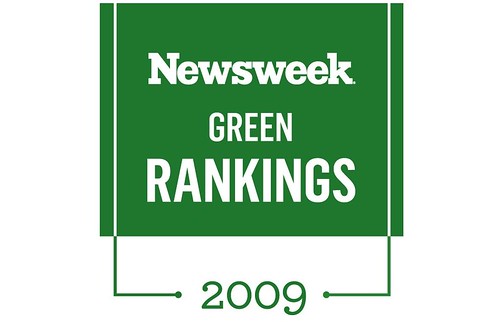Do we really know what's behind a campaign with the latest green/eco/earth-friendly buzz word surrounded by an obligatory green leaf? Is it a symbol of a true systemic business model focusing on sustainability or an effort to grope toward greater market share in a segment customers are willing to pay a premium for?
 Newsweek just posted Green Rankings of the top 500 corporations. As they conducted research for the story, they mentioned the difficulty gathering accurate information on many companies who tend to hide eco-sensitive information. While Trucost was used to project the environmental impact for many companies, 77 of the largest 100 were transparent enough to provide actual information. Kudos to them! Many are reticent to provide this information since it can mean a black eye, even when environmental sensitivity is a priority.
Newsweek just posted Green Rankings of the top 500 corporations. As they conducted research for the story, they mentioned the difficulty gathering accurate information on many companies who tend to hide eco-sensitive information. While Trucost was used to project the environmental impact for many companies, 77 of the largest 100 were transparent enough to provide actual information. Kudos to them! Many are reticent to provide this information since it can mean a black eye, even when environmental sensitivity is a priority.Daniel Goleman's book Ecological Intelligence addresses many of these issues. Goleman points out that there are over 650 steps in the process to produce glass packaging. Greening up one or even 100 of these steps is a move in the right direction, but at what point is it considered a green product? There are no generally accepted or federally established regulations that define what counts as a green product. Because of this, Goleman suggests that "Green" is not an adjective or a noun, but a verb. It is an active process, weighing the relative good against the opportunities to improve.
Marketers seeking to pursue environmental causes should strive to create a business environment of transparency, open dialog, and ritualistic if not religious fervor of every environmental impact throughout the entire supply chain. This is the only way to reveal those who claim the "green" title under false pretenses. While removing the cloak may be uncomfortable for some, it will educate the customer base and endear them through respect and intelligent dialogue. Firms like HP, who is reaping the benefits of steps taken years ago, and Nike, who has made specific efforts to repair PR damage from controversies surrounding contracted factories, deserve to be applauded. Their work has created a competitive advantage and illustrates a model for others that shows these efforts result in real benefits. Be virtuous and trust that your customers will carry you forward!
P.S. Bonus points to anyone who can find a video link to the ad mentioned in the opening paragraph.


